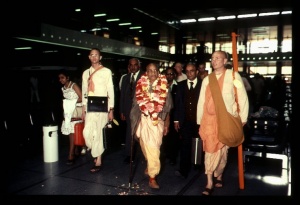BG 18.49: Difference between revisions
m (1 revision(s)) |
(Vanibot #0020 edit - link to the Version Compare feature) |
||
| Line 1: | Line 1: | ||
{{ | [[Category:Bhagavad-gita As It Is (1983+) - Chapter 18]] | ||
<div style="float:left">'''[[Bhagavad-gita As It Is (1983+)]] - [[BG 18 (1983+)|Chapter 18: Conclusion - The Perfection of Renunciation]]'''</div> | |||
<div style="float:right">[[File:Go-previous.png|link=BG 18.48]] '''[[BG 18.48]] - [[BG 18.50]]''' [[File:Go-next.png|link=BG 18.50]]</div> | |||
{{CompareVersions|BG|18.49|BG 1972|BG 1983+}} | |||
{{RandomImage}} | |||
==== TEXT 49 ==== | ==== TEXT 49 ==== | ||
<div class="devanagari"> | |||
:असक्तबुद्धिः सर्वत्र जितात्मा विगतस्पृहः । | |||
:नैष्कर्म्यसिद्धिं परमां संन्यासेनाधिगच्छति ॥४९॥ | |||
</div> | |||
<div | <div class="verse"> | ||
:asakta-buddhiḥ sarvatra | |||
:jitātmā vigata-spṛhaḥ | |||
:naiṣkarmya-siddhiṁ paramāṁ | |||
:sannyāsenādhigacchati | |||
</div> | </div> | ||
==== SYNONYMS ==== | ==== SYNONYMS ==== | ||
<div class="synonyms"> | |||
<div | ''asakta-buddhiḥ''—having unattached intelligence; ''sarvatra''—everywhere; ''jita-ātmā''—having control of the mind; ''vigata-spṛhaḥ''—without material desires; ''naiṣkarmya-siddhim''—the perfection of nonreaction; ''paramām''—supreme; ''sannyāsena''—by the renounced order of life; ''adhigacchati''—one attains. | ||
asakta- | |||
</div> | </div> | ||
==== TRANSLATION ==== | ==== TRANSLATION ==== | ||
<div class="translation"> | |||
<div | |||
One who is self-controlled and unattached and who disregards all material enjoyments can obtain, by practice of renunciation, the highest perfect stage of freedom from reaction. | One who is self-controlled and unattached and who disregards all material enjoyments can obtain, by practice of renunciation, the highest perfect stage of freedom from reaction. | ||
</div> | </div> | ||
==== PURPORT ==== | |||
= | <div class="purport"> | ||
Real renunciation means that one should always think himself part and parcel of the Supreme Lord and therefore think that he has no right to enjoy the results of his work. Since he is part and parcel of the Supreme Lord, the results of his work must be enjoyed by the Supreme Lord. This is actually Kṛṣṇa consciousness. The person acting in Kṛṣṇa consciousness is really a ''sannyāsī'', one in the renounced order of life. By such a mentality, one is satisfied because he is actually acting for the Supreme. Thus he is not attached to anything material; he becomes accustomed to not taking pleasure in anything beyond the transcendental happiness derived from the service of the Lord. A ''sannyāsī'' is supposed to be free from the reactions of his past activities, but a person who is in Kṛṣṇa consciousness automatically attains this perfection without even accepting the so-called order of renunciation. This state of mind is called ''yogārūḍha'', or the perfectional stage of ''yoga''. As confirmed in the Third Chapter, yas tv ātma-ratir eva syāt: one who is satisfied in himself has no fear of any kind of reaction from his activity. | |||
</div> | |||
<div | <div style="float:right; clear:both;">[[File:Go-previous.png|link=BG 18.48]] '''[[BG 18.48]] - [[BG 18.50]]''' [[File:Go-next.png|link=BG 18.50]]</div> | ||
__NOTOC__ | |||
</div> | __NOEDITSECTION__ | ||
__NOTOC__ | |||
Revision as of 20:42, 7 December 2017

A.C. Bhaktivedanta Swami Prabhupada
TEXT 49
- असक्तबुद्धिः सर्वत्र जितात्मा विगतस्पृहः ।
- नैष्कर्म्यसिद्धिं परमां संन्यासेनाधिगच्छति ॥४९॥
- asakta-buddhiḥ sarvatra
- jitātmā vigata-spṛhaḥ
- naiṣkarmya-siddhiṁ paramāṁ
- sannyāsenādhigacchati
SYNONYMS
asakta-buddhiḥ—having unattached intelligence; sarvatra—everywhere; jita-ātmā—having control of the mind; vigata-spṛhaḥ—without material desires; naiṣkarmya-siddhim—the perfection of nonreaction; paramām—supreme; sannyāsena—by the renounced order of life; adhigacchati—one attains.
TRANSLATION
One who is self-controlled and unattached and who disregards all material enjoyments can obtain, by practice of renunciation, the highest perfect stage of freedom from reaction.
PURPORT
Real renunciation means that one should always think himself part and parcel of the Supreme Lord and therefore think that he has no right to enjoy the results of his work. Since he is part and parcel of the Supreme Lord, the results of his work must be enjoyed by the Supreme Lord. This is actually Kṛṣṇa consciousness. The person acting in Kṛṣṇa consciousness is really a sannyāsī, one in the renounced order of life. By such a mentality, one is satisfied because he is actually acting for the Supreme. Thus he is not attached to anything material; he becomes accustomed to not taking pleasure in anything beyond the transcendental happiness derived from the service of the Lord. A sannyāsī is supposed to be free from the reactions of his past activities, but a person who is in Kṛṣṇa consciousness automatically attains this perfection without even accepting the so-called order of renunciation. This state of mind is called yogārūḍha, or the perfectional stage of yoga. As confirmed in the Third Chapter, yas tv ātma-ratir eva syāt: one who is satisfied in himself has no fear of any kind of reaction from his activity.